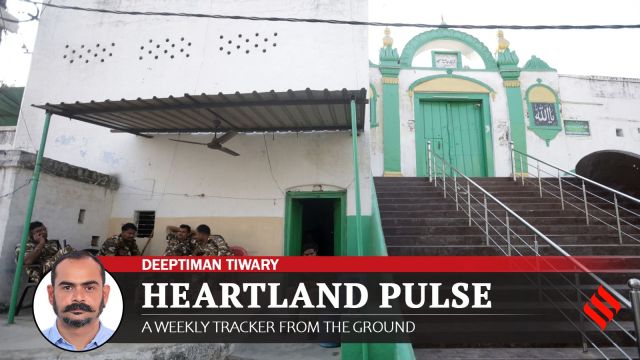Sambhal to Jaunpur: How a surge in mosque rows is shaping UP politics ahead of 2027 polls
The political ramifications in the wake of new petitions and the consequent polarisation may fuel Adityanth’s brand of Hindutva politics, which is seen by many to be more aggressive than the BJP's standard line
 The UP Congress's minority wing has also launched a statewide campaign against alleged violation of this Act in the aftermath of the Sambhal petition. (Express Photo by Gajendra Yadav)
The UP Congress's minority wing has also launched a statewide campaign against alleged violation of this Act in the aftermath of the Sambhal petition. (Express Photo by Gajendra Yadav)The Uttar Pradesh Assembly elections are still more than two years away, but with multiple suits filed in several local courts claiming Hindu rights over various Muslim mosques or sites, the political landscape in the state has already started heating up.
Three of such petitions have been filed in recent weeks in UP, while one, seeking a survey in Ajmer Sharif Dargah, has been filed in an Ajmer court in Rajasthan.
On November 19, a plea was filed in a Chandausi court in UP, claiming Hindu right over the Shahi Jama Masjid in Sambhal. The court ordered a survey of the mosque the same day, with the administration undertaking it by the evening too. Violence erupted during the second survey of this Mughal-era mosque on November 24 in which at least four people were killed.
Since then, petitions filed in the courts making similar claims over Shamshi Shahi mosque in Badaun as well as Atala mosque in Jaunpur have seen significant developments.
The Opposition has cried foul over the manner in which these petitions have been admitted by the lower courts besides the alacrity shown by the state administration in implementing their orders.
Against this backdrop, the Supreme Court has now constituted a special bench to hear a clutch of pending petitions challenging the constitutional validity of the Places of Worship (Special Provisions) Act, 1991, which stipulates that the nature of all places of worship, except the one in Ayodhya that was then under litigation, shall be maintained as it was on August 15, 1947.
Notably, petitions seeking Hindu rights over Gyanvapi mosque in Varanasi and Idgah mosque in Mathura were filed in 2021 – a year before the 2022 UP polls in which the Yogi Adityanath-led BJP returned to power for the second consecutive time, bagging 255 out of 403 seats as against the Samajwadi Party’s 111 seats.
The political ramifications in the wake of new petitions and the consequent polarisation may fuel Adityanth’s brand of Hindutva politics, which is seen by many to be more aggressive than the BJP’s standard line.
The Gorakshnath Math in Gorakhpur, which Adityanath heads, had been closely associated with the Ayodhya movement which culminated in the construction of Ram Temple in January 2024 in the wake of the apex court’s 2019 judgment.
In early 2025, UP’s Prayagraj will also host the Maha Kumbh, which is considered the biggest Hindu cultural event. The CM has already reached out to the RSS top brass to make the event an inclusive one where all castes and sects of the Hindu society could be represented. It has also been seen as Adityanath’s bid to boost his national profile as a Hindutva leader.
In August this year, while addressing a public meeting in Agra, Adityanath had made the “batenge to katenge (divided, we fall)” remark while referring to anti-Hindu violence in Bangladesh. The slogan was used by the BJP in its campaign in the recent Maharashtra polls, which the party-led Mahayuti clinched by a landslide. It was even endorsed by RSS general secretary Dattatreya Hosabale.
“Hindutva plus law and order, governance and welfare is the sum total of Maharaj ji (Adityanath)’s politics. But Hindutva is the base on which everything else is built upon. Also, the Opposition has demonstrated (in the 2024 Lok Sabha polls), at least in UP, that it is as good as the BJP in social engineering. The law and order achievements have been used successfully in the 2022 polls, even as the welfare politics has entered a competitive phase now.” a UP BJP leader said, adding that “At a time when the Opposition is bent on dividing the society on caste lines, we have to build up further on Hindutva.”
Denying that the government had anything to do with the petitions, he also claimed: “They (petitioners) are all individuals neither connected with the BJP nor with the Sangh Parivar. The matters are all in courts. But if the other side creates trouble despite court orders, action is bound to be taken under the Yogi government.”
The petitions have also evoked divergent responses from the parties of the Opposition INDIA bloc. The SP, the principal Opposition in UP, has blamed the state government for the deaths in Sambhal, accusing the BJP of “spreading hate”. SP chief Akhilesh Yadav has, however, not made any attempts to visit Sambhal so far. Only the SP’s Leader of Opposition (LoP) in the Assembly Mata Prasad Pandey made an attempt to visit the town with a delegation of party leaders on November 30, which was thwarted by the administration.
Many see this as the SP’s move to tread cautiously on the issue in a bid to prevent the BJP from polarising the matter.
On the other hand, the Congress has not only been vocal on the issue but party leaders Rahul Gandhi and Priyanka Gandhi have even tried to visit Sambhal only to be stopped by UP police. Earlier this month, the Congress Working Committee reiterated its commitment to the Places of Worship Act in one of its resolutions passed at the meeting.
The UP Congress’s minority wing has also launched a statewide campaign against alleged violation of this Act in the aftermath of the Sambhal petition. The campaign was kicked off on the anniversary of the Babri Masjid demolition on December 6, which also marks the death anniversary of B R Ambedkar, the architect of the Constitution.
Some UP Congress leaders have even alleged that reopening of these disputes could extend to the issue of lands allotted to Dalits.
The Congress has been attempting to reconsolidate its traditional vote bank of Muslims and Dalits, which was seen in the 2024 Lok Sabha polls, when it had accused the ruling BJP of trying to allegedly “change the Constitution”.
The support from these sections would also put the grand old party in a better position to negotiate seat-sharing with its INDIA ally SP for the 2027 Assembly polls.


- 01
- 02
- 03
- 04
- 05





























